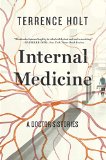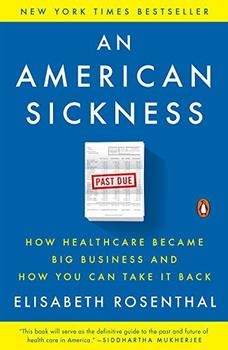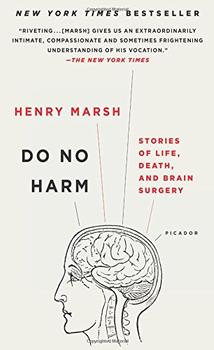Summary | Excerpt | Reviews | Beyond the book | Read-Alikes | Genres & Themes | Author Bio

A Doctor's Stories
by Terrence HoltWhen we go to a doctor we hope that they know what they're doing. We want them to be compassionate, and sure of an outcome that gets us better. We've read the news about doctors making mistakes, but we don't want this to happen to us. We've only got the one body, after all. We want the best care possible for it.
In Internal Medicine, a collection of stories stretched out over the length of one doctor's residency, doctor and author Terrence Holt gives us faith in that "best care" scenario, as well as hope that there are doctors like him in our communities. He begins his stories at the start of his residency in internal medicine, but they are not based entirely on his experiences. From the introduction:
In writing these stories I have drawn on what I thought and felt and generally did as a resident, but in re-creating experience as parable I have watched the narrator of these pieces evolve into someone else. He dealt with patients different from the ones I cared for, and did so, necessarily, in ways I never did.
In a way, Holt, looking back on his residency with the subsequent experiences of a full-fledged doctor, has a beneficial hindsight. It is clear that he has taken in what's important to him from his career experiences, and, after looking thoughtfully at each piece, shows them to us. By this method, Holt carefully and gracefully sculpts his words to the very marrow of their meaning. Under the surface of the simple language he employs, there is enormous impact that makes us sit back and think about these stories long after.
Take, for example, "The Perfect Code," the first few pages of which is a vivid, jarring description of what happens during a "code," when a patient's heart has stopped and a hospital medical team is trying to revive her. To get readers right in the middle of this frantic activity, Holt places it in second person. It's not him. It's you. You're the one with the paddles in hand.
Holt describes patients, from the dying Mrs. B in "A Sign of Weakness," who staunchly refuses an oxygen mask; to Mr. Jenkins in "Giving Bad News," who doesn't remember being given his cancer diagnosis; to the obese Marie's critical heart condition in "Heart Failure," who has a beautiful memory of ice cream missing from a cone. All that Holt seems to ask for from us, his readers, is that we take something that is meaningful from his stories, which might mean watching our own health or considering a hospital from the perspectives of those who give it life, especially that of a doctor with Herculean stamina, even without much sleep.
"The Surgical Mask," about an elective month that Holt took during his residency to be part of the hospice service, feels like the centerpiece of Internal Medicine. The patient is Sylvia Turner, ravaged by cancer of the nose, half her face hidden behind a surgical mask. Through this story, Holt shows that illness doesn't solely define a person. He sees – and allows the reader thus to see – countless paintings lovingly featuring parrots, all created by Sylvia before the cancer cruelly snatched her away from her art. In that moment, Internal Medicine cements itself as a book about compassionate caring, and reading it offers hope that doctoring can and should be done right.
Hopefully Holt will give us more books to ponder and to appreciate just like this one.
![]() This review was originally published in The BookBrowse Review in October 2014, and has been updated for the
November 2015 edition.
Click here to go to this issue.
This review was originally published in The BookBrowse Review in October 2014, and has been updated for the
November 2015 edition.
Click here to go to this issue.

If you liked Internal Medicine, try these:

by Elisabeth Rosenthal
Published 2018
Award-winning New York Times reporter Dr. Elisabeth Rosenthal reveals the dangerous, expensive, and dysfunctional American healthcare system, and tells us exactly what we can do to solve its myriad of problems.

by Henry Marsh
Published 2016
An unforgettable insight into the countless human dramas that take place in a busy modern hospital, and a lesson in the need for hope when faced with life's most difficult decisions.
Your guide toexceptional books
BookBrowse seeks out and recommends the best in contemporary fiction and nonfiction—books that not only engage and entertain but also deepen our understanding of ourselves and the world around us.